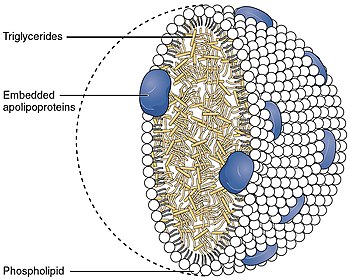Phospholipid transfer protein
Appearance
Phospholipid transfer protein is a protein that in humans is encoded by the PLTP gene.
Function
[edit]The protein encoded by this gene is one of at least two lipid transfer proteins found in human plasma. The encoded protein transfers phospholipids from triglyceride-rich lipoproteins to high density lipoprotein (HDL). In addition to regulating the size of HDL particles, this protein may be involved in cholesterol metabolism. At least two transcript variants encoding different isoforms have been found for this gene.[5]
Interactions
[edit]PLTP has been shown to interact with Apolipoprotein A1[6] and APOA2.[6]
Interactive pathway map
[edit]Click on genes, proteins and metabolites below to link to respective articles. [§ 1]
Statin pathway edit
- ^ The interactive pathway map can be edited at WikiPathways: "Statin_Pathway_WP430".
References
[edit]- ^ a b c GRCh38: Ensembl release 89: ENSG00000100979 – Ensembl, May 2017
- ^ a b c GRCm38: Ensembl release 89: ENSMUSG00000017754 – Ensembl, May 2017
- ^ "Human PubMed Reference:". National Center for Biotechnology Information, U.S. National Library of Medicine.
- ^ "Mouse PubMed Reference:". National Center for Biotechnology Information, U.S. National Library of Medicine.
- ^ "Entrez Gene: PLTP phospholipid transfer protein".
- ^ a b Pussinen PJ, Jauhiainen M, Metso J, Pyle LE, Marcel YL, Fidge NH, Ehnholm C (Jan 1998). "Binding of phospholipid transfer protein (PLTP) to apolipoproteins A-I and A-II: location of a PLTP binding domain in the amino terminal region of apoA-I". J. Lipid Res. 39 (1): 152–61. doi:10.1016/S0022-2275(20)34211-5. PMID 9469594.
Further reading
[edit]- Jiang XC (2002). "The effect of phospholipid transfer protein on lipoprotein metabolism and atherosclerosis". Front. Biosci. 7 (1–3): d1634-41. doi:10.2741/jiang1. PMID 12086920.
- Albers JJ, Cheung MC (2004). "Emerging roles for phospholipid transfer protein in lipid and lipoprotein metabolism". Curr. Opin. Lipidol. 15 (3): 255–60. doi:10.1097/00041433-200406000-00004. PMID 15166780. S2CID 34754445.
- Dallinga-Thie GM, Dullaart RP, van Tol A (2007). "Concerted actions of cholesteryl ester transfer protein and phospholipid transfer protein in type 2 diabetes: effects of apolipoproteins". Curr. Opin. Lipidol. 18 (3): 251–7. doi:10.1097/MOL.0b013e3280e12685. PMID 17495597. S2CID 20012553.
- Whitmore TE, Day JR, Albers JJ (1995). "Localization of the human phospholipid transfer protein gene to chromosome 20q12-q13.1". Genomics. 28 (3): 599–600. doi:10.1006/geno.1995.1198. PMID 7490104.
- Albers JJ, Wolfbauer G, Cheung MC, Day JR, Ching AF, Lok S, Tu AY (1995). "Functional expression of human and mouse plasma phospholipid transfer protein: effect of recombinant and plasma PLTP on HDL subspecies". Biochim. Biophys. Acta. 1258 (1): 27–34. doi:10.1016/0005-2760(95)00091-p. PMID 7654777.
- Maruyama K, Sugano S (1994). "Oligo-capping: a simple method to replace the cap structure of eukaryotic mRNAs with oligoribonucleotides". Gene. 138 (1–2): 171–4. doi:10.1016/0378-1119(94)90802-8. PMID 8125298.
- Day JR, Albers JJ, Lofton-Day CE, Gilbert TL, Ching AF, Grant FJ, O'Hara PJ, Marcovina SM, Adolphson JL (1994). "Complete cDNA encoding human phospholipid transfer protein from human endothelial cells". J. Biol. Chem. 269 (12): 9388–91. doi:10.1016/S0021-9258(17)37120-X. PMID 8132678.
- Tu AY, Wolfbauer G, Albers JJ (1995). "Functional characterization of the promoter region of the human phospholipid transfer protein gene". Biochem. Biophys. Res. Commun. 217 (3): 705–11. doi:10.1006/bbrc.1995.2830. PMID 8554588.
- Andersson B, Wentland MA, Ricafrente JY, Liu W, Gibbs RA (1996). "A "double adaptor" method for improved shotgun library construction". Anal. Biochem. 236 (1): 107–13. doi:10.1006/abio.1996.0138. PMID 8619474.
- Hailman E, Albers JJ, Wolfbauer G, Tu AY, Wright SD (1996). "Neutralization and transfer of lipopolysaccharide by phospholipid transfer protein". J. Biol. Chem. 271 (21): 12172–8. doi:10.1074/jbc.271.21.12172. PMID 8647810.
- Yu W, Andersson B, Worley KC, Muzny DM, Ding Y, Liu W, Ricafrente JY, Wentland MA, Lennon G, Gibbs RA (1997). "Large-scale concatenation cDNA sequencing". Genome Res. 7 (4): 353–8. doi:10.1101/gr.7.4.353. PMC 139146. PMID 9110174.
- Suzuki Y, Yoshitomo-Nakagawa K, Maruyama K, Suyama A, Sugano S (1997). "Construction and characterization of a full length-enriched and a 5'-end-enriched cDNA library". Gene. 200 (1–2): 149–56. doi:10.1016/S0378-1119(97)00411-3. PMID 9373149.
- Pussinen PJ, Jauhiainen M, Metso J, Pyle LE, Marcel YL, Fidge NH, Ehnholm C (1998). "Binding of phospholipid transfer protein (PLTP) to apolipoproteins A-I and A-II: location of a PLTP binding domain in the amino terminal region of apoA-I". J. Lipid Res. 39 (1): 152–61. doi:10.1016/S0022-2275(20)34211-5. PMID 9469594.
- Jiang XC, D'Armiento J, Mallampalli RK, Mar J, Yan SF, Lin M (1998). "Expression of plasma phospholipid transfer protein mRNA in normal and emphysematous lungs and regulation by hypoxia". J. Biol. Chem. 273 (25): 15714–8. doi:10.1074/jbc.273.25.15714. PMID 9624168.
- Jauhiainen M, Huuskonen J, Baumann M, Metso J, Oka T, Egashira T, Hattori H, Olkkonen VM, Ehnholm C (1999). "Phospholipid transfer protein (PLTP) causes proteolytic cleavage of apolipoprotein A-I". J. Lipid Res. 40 (4): 654–64. doi:10.1016/S0022-2275(20)32144-1. PMID 10191289.
- Qu SJ, Fan HZ, Kilinc C, Pownall HJ (1999). "Role of cysteine residues in human plasma phospholipid transfer protein". J. Protein Chem. 18 (2): 193–8. doi:10.1023/A:1020628006453. PMID 10333293. S2CID 1653738.
- Lie J, de Crom R, Jauhiainen M, van Gent T, van Haperen R, Scheek L, Jansen H, Ehnholm C, van Tol A (2001). "Evaluation of phospholipid transfer protein and cholesteryl ester transfer protein as contributors to the generation of pre beta-high-density lipoproteins". Biochem. J. 360 (Pt 2): 379–85. doi:10.1042/0264-6021:3600379. PMC 1222238. PMID 11716766.
- Kärkkäinen M, Oka T, Olkkonen VM, Metso J, Hattori H, Jauhiainen M, Ehnholm C (2002). "Isolation and partial characterization of the inactive and active forms of human plasma phospholipid transfer protein (PLTP)". J. Biol. Chem. 277 (18): 15413–8. doi:10.1074/jbc.M112247200. PMID 11854286.
- Murdoch SJ, Wolfbauer G, Kennedy H, Marcovina SM, Carr MC, Albers JJ (2002). "Differences in reactivity of antibodies to active versus inactive PLTP significantly impacts PLTP measurement". J. Lipid Res. 43 (2): 281–9. doi:10.1016/S0022-2275(20)30170-X. PMID 11861670.








